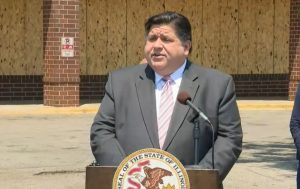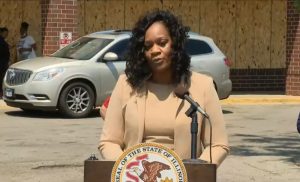Pritzker announces $900 million in rent support, business relief
By Jerry Nowicki Capitol News Illinois — June 18, 2020
Gov. J.B. Pritzker speaks at a news conference June 17 on the west side of Chicago as he unveils $900 million in aid programs related to COVID-19 and property damage resulting from civil unrest. (Credit: Blueroomstream.com)
SPRINGFIELD — Gov. J.B. Pritzker announced Wednesday, June 17 he will extend a moratorium on evictions in the state until July 31, and a new state grant program that will begin in August to give assistance to those who are behind on rent.
There will be $150 million dedicated to each an emergency rental assistance and emergency mortgage assistance program, which will begin in August. Those were two of several programs totaling $900 million in state aid that were highlighted in a Chicago news conference by Pritzker and legislative leaders.
“Today we take another step forward in delivering Illinois much needed support in an effort to get through this crisis and rebound with a stronger, more inclusive economy on the other side of this pandemic,” Pritzker said. “With assistance from the federal CARES Act and in partnership with the General Assembly, including from the Black Caucus, Latino Caucus and Asian Caucus, my administration has put together a support package of over $900 million to lift up small businesses, working families and black and brown communities who have been hit the hardest by COVID-19 financial impacts.”
The rental program will be run by the Illinois Housing Development Authority and applies to those who have been unable to pay rent due to COVID-19. The program allows for grants of $5,000 to provide emergency rental assistance. Pritzker said it is expected to be running by August, lasting through the end of the year.
To be eligible, a tenant must carry an unpaid rent balance from March through present day and be able to certify that COVID-19 related income loss is the reason they cannot afford rent. The governor’s office anticipates the program can help approximately 30,000 renters.
Assistance will be paid directly to a property owner or landlord on behalf of the tenant, and landlords accepting assistance must agree not to evict the tenant for the duration of the agreement.
A similar emergency mortgage program creates grants of up to $15,000 to homeowners who need support with mortgage payments. That program also is expected to launch in August, and the governor’s office anticipates it will serve approximately 10,000 people.
Eligible homeowners’ must have had an income not exceeding 120 percent of the area median income prior to the pandemic, and must be able to certify that the reason they could not pay their mortgage in full was due to a COVID-19-related loss of income.
Grants from both programs will be allotted on a first-applied, first-approved basis.
The extension of the residential eviction ban through July 31 is an effort to “give people a smooth transition into these new assistance programs,” Pritzker said.

Senate Majority Leader Kimberly Lightford, D-Maywood, speaks at a news conference Wednesday, June 17 on the west side of Chicago as she joins Gov. J.B. Pritzker in unveiling $900 million in aid programs related to COVID-19 and property damage resulting from civil unrest. (Credit: Blueroomstream.com)
Business Interruption Grants
The governor also announced that, in early July, the state Department of Commerce and Economic Opportunity will begin distributing the first $60 million installment of Business Interruption Grants, which are funded by the federal Coronavirus Aid, Relief and Economic Security, or CARES, Act.
The BIG program can help up to 3,500 businesses that faced disruptions due to COVID-19 related closures.
In all, that program will receive $540 million in funding, half of which the state has dedicated to child care providers. Small businesses that have been “heavily restricted or completely shut down” in areas disproportionately impacted by COVID-19 will be prioritized in the first funding wave, according to the governor’s office.
One-third of the first $60 million installment will go to 1,000 businesses in grants of $20,000 in areas impacted by property damage resulting from recent civil unrest. The same amount will be dedicated to 1,000 bars and restaurants unable to offer outside service.
There will be $10 million dedicated to 1,000 grants of up to $10,000 for barbershops and salons, and $20 million dedicated to 500 grants of $20,000 each for gyms and fitness centers.
Applications will be available on Monday, June 22, through DCEO.
Other programs
Existing Illinois Department of Human Services funding totaling $32.5 million will go toward other poverty alleviation strategies.
The program will begin in June, go through the summer, and support more than 73,000 people across the state by “building upon contracts and services to target communities disproportionately affected by the pandemic,” according to the governor’s office.
Those programs include expansion of food banks and mental health services, grants for community-based organizations, a one-time payment of $500 to persons receiving Temporary Assistance for Needy Families benefits and more.
Another DCEO economic recovery program will provide $25 million to support businesses that sustained property damage during the recent protests and demonstrations in response to the video-recorded killing of George Floyd on May 25 in Minneapolis. The funding will come from the Rebuild Illinois capital infrastructure program.
“It is the fact that minority business owners are more likely to employ people of color and give opportunities to those in need of a second chance,” Illinois Senate Majority Leader Kimberly Lightford, D-Maywood, said at the event. “Black communities are the hardest hit by COVID-19. Another symptom of the disease that is racism in our country. … This is the work that we fought for, for black and Latino communities, who deserve nothing less than reassurance that we are going to make them whole, and then we are going to make them grow.”
That program will reimburse the costs to repair damages and will prioritize small businesses, women and minority-owned businesses, underinsured or uninsured businesses, and businesses in communities that have experienced historic disinvestment. Businesses that have a high community impact, such as grocery stores, will also be prioritized.
COVID-19 update
Pritzker also touted Illinois as “one of the best states in the nation in terms of the rates of (COVID-19) cases and hospitalizations, ICU beds and deaths going down,” and said he does not anticipate moving backward in the Restore Illinois reopening plan.
The state announced another 546 new confirmed cases of the virus Wednesday, along with 86 more deaths. That brought the number of confirmed cases since the pandemic began to 134,185, including 6,485 total deaths.
Hospitalizations from the virus fell below 1,900 as of midnight Tuesday for the first time since the state began reporting the data on April 12. There remained fewer than 600 COVID-19 patients in intensive care beds and fewer than 350 on ventilators as of midnight, signifying a continued downward trend in the metrics.
jnowicki@capitolnewsillinois.com



